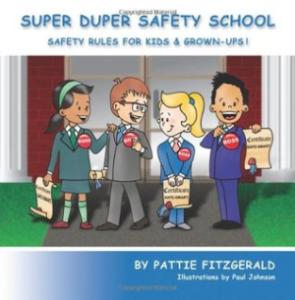Super duper disappointment.

It's got a good message, but it doesn't communicate it well, which is frustrating. I need to teach my four-year-old about being safe around other people, not to let anybody touch him in a way that he doesn't want to be touched, don't get in a van with somebody you don't know, that kind of thing. I understand that the concept of "stranger danger" is neither effective as a teaching tool ("oh, I know his name, now he's not a stranger") nor useful (most children who are victimized are victimized by people they know). And this is THE book for the "tricky people" concept, which seems to be a much better idea. But the language used in this book is very patronizing, which starts driving me bonkers. It's almost like baby talk. "Wearing a helmet when you ride your bike is thumbs-up safe." "Getting close to a stranger's car when you're by yourself is really UnSafe! That's a BIG THUMBS DOWN!" It feels like it's trivializing the danger. I mean, I don't want to scare my children, but this is more like, "I'd rather you not sexually molest me. No thanks."
The first rule is, "I am the BOSS OF MY BODY!" It says, "Did you know that you are so SPECIAL and so IMPORTANT... and that you are a BOSS?" That doesn't feel grammatically correct. I get the idea of being the "boss of my body," but it seems like they're being childish, and it certainly doesn't make me want to listen to what this book has to say. Plus, the illustrations are just weird, inconsistent, and not serious enough for the topic. There are pictures of what appear to be children in three-piece suits with ties. And the jargon-- why introduce a completely new vocabulary for concepts that children already experience in other areas of their lives? What is a "smart boss"? A "safe boss"? "Thumbs-up safe"? "Thumbs-down unsafe"? How is an adult who is unfamiliar with this book supposed to interpret those phrases? I've kind of missed the boat on "tricky people"-- that one's already in the public consciousness a bit. But for me, "tricky" means "difficult." As in, a tricky problem to solve. But this book uses it as "deceitful." And I'm not sure there's a better word to use there, it's just that the alternate definition of "tricky" feels awkward to me. "A thumbs-down touch makes you feel yucky, or scared, or confused." What's wrong with saying "bad touch"? We already have a phrase for this. It might be a bit childish, but it's already in the vernacular. The book describes a "thumbs-down touch" as something like having a warning bell inside you, and getting an "uh-oh feeling." Baby talk. Like going "boom-boom" in the "potty." I don't use those words with my kids (we "poop" in the "toilet" like adults), and they're going to sense my awkwardness with words like these and it'll just confuse them. It's not an "uh-oh" feeling, it's an "anxious" or a "worried" or a "scared" feeling. These aren't rare words. Kids know what being "scared" and "worried" mean. And if you're going to teach them weird terminology, it might as well be something that adults can understand. I can't imagine the reaction of a cashier (or "cash register person" as the book says) when a lost child goes up to them and says, "Smart boss! Thumbs-down unsafe!" It's ridiculous sounding, and infantilizing. Children might not be as experienced as adults, and they differ in many ways, but they have the same basic emotions. They can say, "I'm scared." This is more like a secret code, and it needs to be easy to communicate to potential helpers. Fear and worry are not feelings exclusive to kids, so they don't need their own words.
Like I said, I totally understand what she's trying to say, and it's an incredibly important message, but the writing and the illustrations are so bad that I just can't get past them. It's really disappointing, because I think a book would be very helpful in explaining this to my kids. But this is not that book, at least not for me. Maybe I need to write my own.
As for a better word, how
As for a better word, how about "suspicious" instead of "tricky"?
Suspicious
That's a good suggestion, thanks!